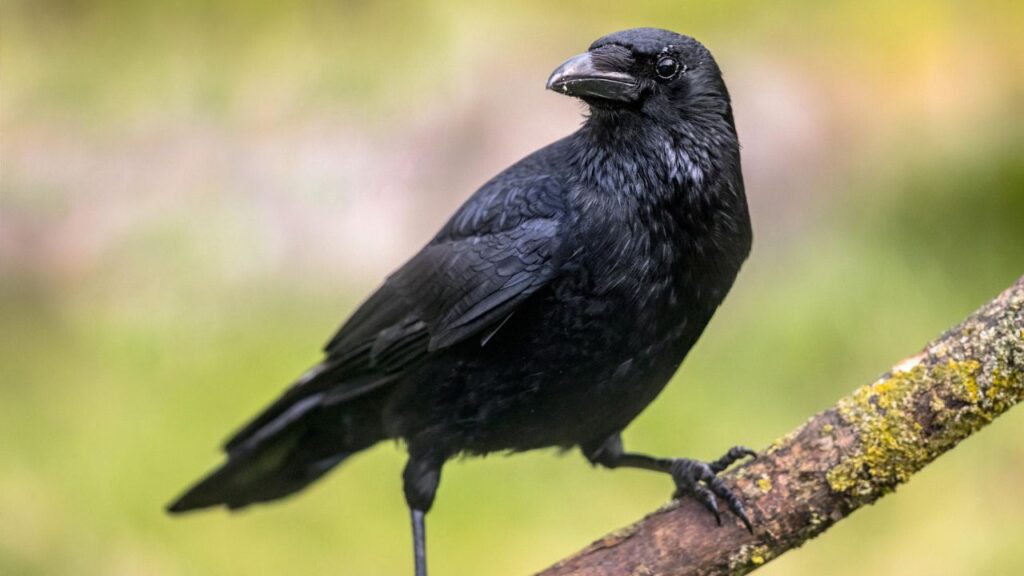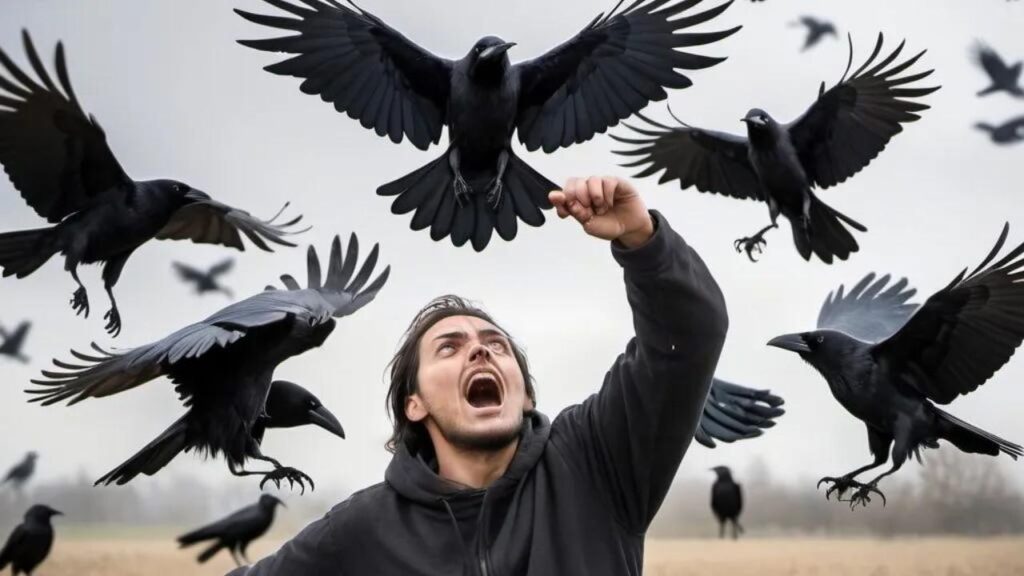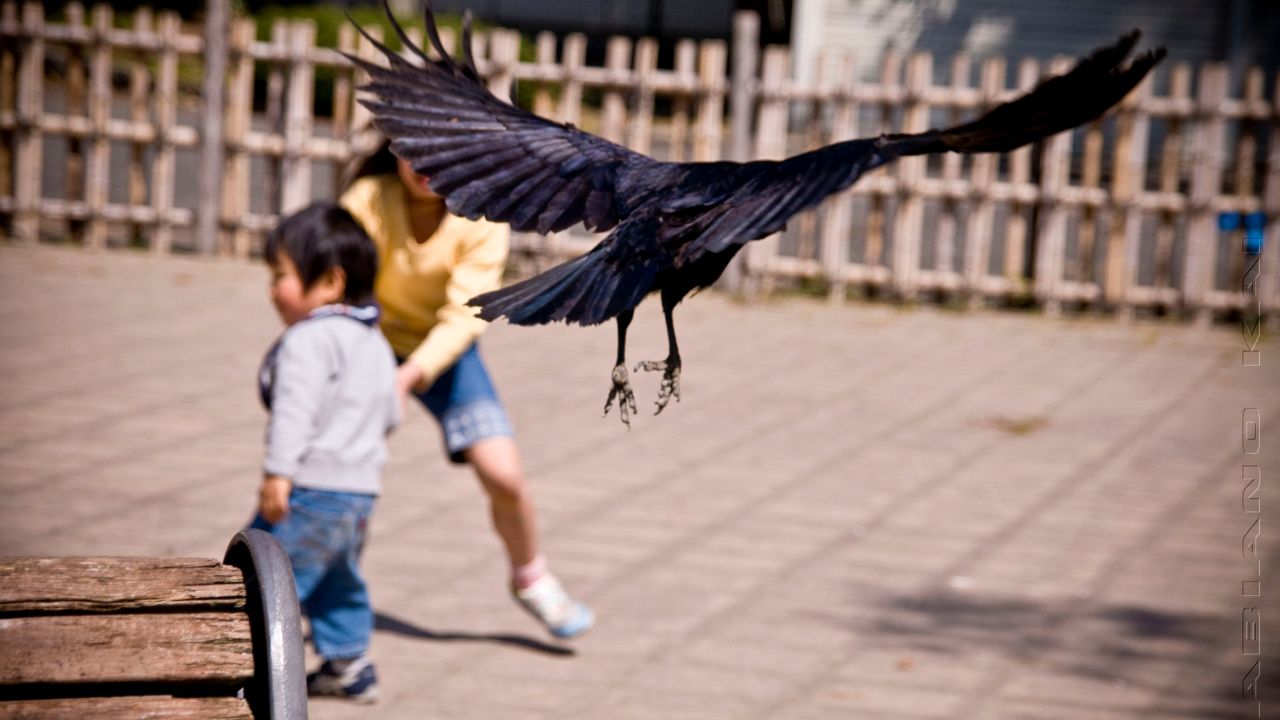Will Crows Attack Humans? Crows generally attack humans only if they feel threatened or are protecting their nests, particularly during the breeding season.
Crows are intelligent and fascinating birds often seen as ominous symbols in literature and folklore.
However, beyond their literary representations, these birds have complex behaviors and interactions with humans that warrant closer examination.
One pressing question many people have is: will crows attack humans? This article delves into the nature of crows, the reasons behind their occasional aggression towards humans, and how to prevent and handle such encounters.
Contents
Who Are Crows?
Crows belong to the Corvidae family, which also includes ravens, magpies, and jays. They are known for their high intelligence, problem-solving abilities, and complex social structures.
With a wide distribution across various continents, crows are adaptable birds found in both urban and rural environments.
Crows are medium-sized birds with predominantly black plumage, strong beaks, and distinctive cawing sounds.
Their intelligence is often compared to that of a seven-year-old child, making them one of the most intelligent bird species.
This intelligence is exhibited in their use of tools, memory of human faces, and ability to learn and mimic sounds.
Crows have been observed using sticks to extract insects from tree bark and even using leaves as makeshift cups to carry water.
Their social structures are equally complex, with crows often living in family units and cooperating in activities such as feeding and defending their territories.

Reasons Why Crows Might Attack Humans
Protection of Nests
One of the primary reasons crows might attack humans is to protect their nests. During the breeding season, which typically spans from April to July, crows become highly territorial and aggressive.
They perceive any approach towards their nesting sites as a potential threat to their eggs or fledglings. This protective behavior is a survival instinct to ensure the safety of their young.
For example, if a person unknowingly walks near a crow’s nest, the parent birds may interpret this as an imminent danger to their offspring and respond aggressively to deter the perceived threat.
Perceived Threats
Crows are excellent at recognizing potential threats, including humans. [Will Crows Attack Humans?]
If a crow perceives a person as a threat—whether due to past negative encounters or the individual’s proximity to their nest—it may react aggressively. This reaction can include dive-bombing, cawing loudly, and pecking.
Their ability to remember faces means that once they identify someone as a threat, they may continue to attack that person in future encounters.
Research has shown that crows have remarkable facial recognition abilities, allowing them to distinguish between friendly and threatening individuals over long periods.
Territorial Aggression
Apart from nesting season, crows also exhibit territorial aggression to protect their feeding grounds and roosting sites.
If a human enters what a crow considers its territory, the bird might resort to aggressive behaviors to drive the intruder away.
This is particularly common in urban areas where human and crow territories frequently overlap.
In parks, gardens, and other public spaces, crows may view regular human presence as encroachments on their territory, leading to increased confrontations.

Types of Crow Attacks
Dive-Bombing
Dive-bombing is a common tactic used by crows to deter perceived threats. [Will Crows Attack Humans?]
The bird swoops down at high speed towards the intruder, often aiming for the head. This tactic is meant to startle and intimidate rather than cause serious harm.
While it can be frightening, dive-bombing usually results in only minor scratches or none at all.
Observations have noted that dive-bombing is more frequent during the breeding season and in areas where crows have had negative experiences with humans.
Mobbing
Mobbing occurs when multiple crows work together to harass a perceived threat. This behavior is not limited to humans; crows will also mob predators such as hawks and owls.
During a mobbing event, crows surround the intruder, caw loudly, and make repeated swoops.
This collective defense mechanism increases the effectiveness of their deterrent efforts. [Will Crows Attack Humans?]
Mobbing can sometimes involve dozens of crows, creating a chaotic and intimidating display designed to drive away potential predators or threats.
Pecking and Clawing
In rare cases, if a crow feels extremely threatened or cornered, it may resort to pecking and clawing.
Although crows do not have the sharp talons of raptors, their beaks are strong enough to cause minor injuries.
These attacks are usually brief and more focused on scaring the intruder away rather than inflicting serious harm.
Instances of pecking and clawing are typically isolated and occur only when other deterrent methods have failed.

When and Where Crow Attacks Are Most Likely
Breeding Season
The likelihood of crow attacks increases significantly during the breeding season. During this time, crows are more protective and vigilant, ready to defend their nests against any perceived threat.
It is advisable to be more cautious around known nesting areas during this period to avoid provoking these protective behaviors.
Parks, wooded areas, and even urban settings can become hotspots for aggressive crow behavior during this time.
Urban Areas
Crow attacks are more common in urban areas where human activities encroach on crow territories.
Cities provide abundant food sources and nesting sites for crows, leading to higher interactions between humans and crows.
Urban environments also mean that crows are more accustomed to human presence, which can lead to more frequent conflicts.
Garbage disposal sites, public parks, and residential areas are common locations where crow-human interactions might turn aggressive.
Proximity to Nests
The closer one gets to a crow’s nest, the higher the chances of an attack. Crows are most aggressive when they feel their young are in danger.
Identifying and avoiding areas with visible crow nests can significantly reduce the risk of attacks. [Will Crows Attack Humans?]
Nests are typically built in tall trees or man-made structures like telephone poles, making them noticeable if one knows what to look for.
Preventing Crow Attacks
Avoid Nesting Areas
One of the most effective ways to prevent crow attacks is to avoid nesting areas, especially during the breeding season.
Look out for signs of nesting activity such as crows frequently flying to and from a specific location, loud cawing, and territorial behaviors. If you identify a nesting area, give it a wide berth to avoid provoking the crows.
Educating the public about the presence of nesting areas through signs or community announcements can also help reduce incidents.
Do Not Feed Crows
Feeding crows can encourage them to become more territorial and aggressive, as they associate humans with food sources.
This can lead to increased aggression towards people who they perceive as competitors or threats to their food supply.
To prevent this, avoid feeding crows and ensure that garbage and food waste are properly secured.
Feeding bans in public parks and other communal areas can be an effective measure to prevent human-crow conflicts.
Use Protective Gear
When in areas known for aggressive crow behavior, carrying an umbrella or wearing a hat can provide protection.
Umbrellas can be particularly effective against dive-bombing attacks, creating a barrier between you and the crow.
Hats can help protect your head and face from pecking. Some communities have even distributed protective headgear during peak breeding seasons to mitigate attacks.
Maintain Distance
Maintaining a respectful distance from crows and their nesting areas is crucial. If you notice crows becoming agitated or aggressive, slowly and calmly move away from the area.
Avoid sudden movements that could further provoke the birds. [Will Crows Attack Humans?]
Creating buffer zones around known nesting sites in parks and residential areas can help minimize conflicts.
What to Do if Attacked by a Crow
Stay Calm
If you find yourself under attack by a crow, it is important to stay calm. Panicking or swatting at the bird can escalate the situation, leading to more aggressive behavior.
Crows are more likely to retreat if you remain composed and non-threatening. Taking deep breaths and avoiding sudden movements can help de-escalate the situation.
Move Away
Slowly moving away from the area can help de-escalate the situation. Avoid running or making sudden movements, as this can trigger further aggression.
Try to identify the direction of the crow’s nest and move away from it to reduce the perceived threat. If possible, seek shelter indoors or in a vehicle until the crow loses interest.
Protect Vulnerable Areas
If a crow is dive-bombing or pecking at you, use your arms or an object like an umbrella to protect your head and face.
Keeping vulnerable areas covered can minimize injuries and make it more difficult for the crow to make contact.
Wearing sunglasses or protective eyewear can also help protect your eyes during an attack. [Will Crows Attack Humans?]
See Also: Do Ostriches Attack Humans? The Shocking Truth!
FAQs
Do Crow Attacks Cause Serious Injuries?
Crow attacks rarely cause serious injuries. Most attacks result in minor scratches or none at all. The primary goal of a crow attack is to scare off the intruder rather than inflict harm. However, it is still important to avoid provoking crows to minimize the risk of any injury. In rare cases, if a person has an allergic reaction to a crow scratch, medical attention may be required.
Can Crows Remember Faces?
Yes, crows have excellent memories and can remember human faces. They can recognize individuals who have previously threatened or harmed them and may target these people in future encounters. This ability to remember faces highlights the importance of avoiding negative interactions with crows. Studies have shown that crows can remember faces for years, passing on this information to other crows.
Are Crow Attacks Common?
Crow attacks are relatively uncommon and usually occur only when the birds feel threatened. Most crows will avoid humans and only resort to aggression as a last resort. Understanding their behavior and avoiding potential triggers can help prevent these rare occurrences. Public awareness campaigns can help educate people about the reasons behind crow aggression and how to avoid it.
Why Do Crows Attack Pets?
Crows may attack small pets, such as dogs or cats, if they perceive them as threats to their nests or territory. These attacks are typically defensive and aimed at scaring the pet awaysuch as dogs or cats, if they perceive them as threats to their nests or territory. These attacks are typically defensive and aimed at scaring the pet away rather than causing harm. Keeping pets indoors or supervised can help prevent these encounters. Additionally, understanding the signs of territorial behavior in crows can help pet owners take precautions.
How to React if a Crow Is Stalking You?
If a crow seems to be persistently following or targeting you, it is best to remain calm and move away from the area. Avoid making eye contact and do not act aggressively towards the bird. In some cases, carrying a small treat like peanuts can help distract the crow and redirect its attention. It is also helpful to avoid wearing shiny objects that might attract the crow’s curiosity or aggression.
What Should I Do if I Find a Crow’s Nest?
If you discover a crow’s nest, it is important to keep your distance and avoid disturbing it. Crows are highly protective of their nests and will aggressively defend them. Mark the location mentally or with a discreet marker so you can avoid the area in the future. Educating community members about the presence of nests can also help prevent accidental disturbances and subsequent attacks.
Conclusion: Will Crows Attack Humans?
In summary, while crows are fascinating and intelligent birds, they can exhibit aggressive behavior towards humans, particularly when defending their nests.
Understanding the reasons behind crow attacks and knowing how to prevent and respond to them can help foster a more harmonious coexistence with these remarkable creatures.
By respecting their space and taking preventive measures, we can minimize conflicts and appreciate the unique qualities that make crows such intriguing members of the avian world.
Encourage readers to share their experiences or ask questions in the comments, fostering a community of shared knowledge and respect for wildlife.

Hello, I am Rosa Ellis, a mother of two and a wildlife blogger. I grew up in New York City, but I love exploring forests. I’ve traveled to places like Yellowstone National Park and the Amazon Rainforest to see animals up close. I know a lot about animal behavior and which animals can be dangerous to humans. Thanks for visiting my blog!

